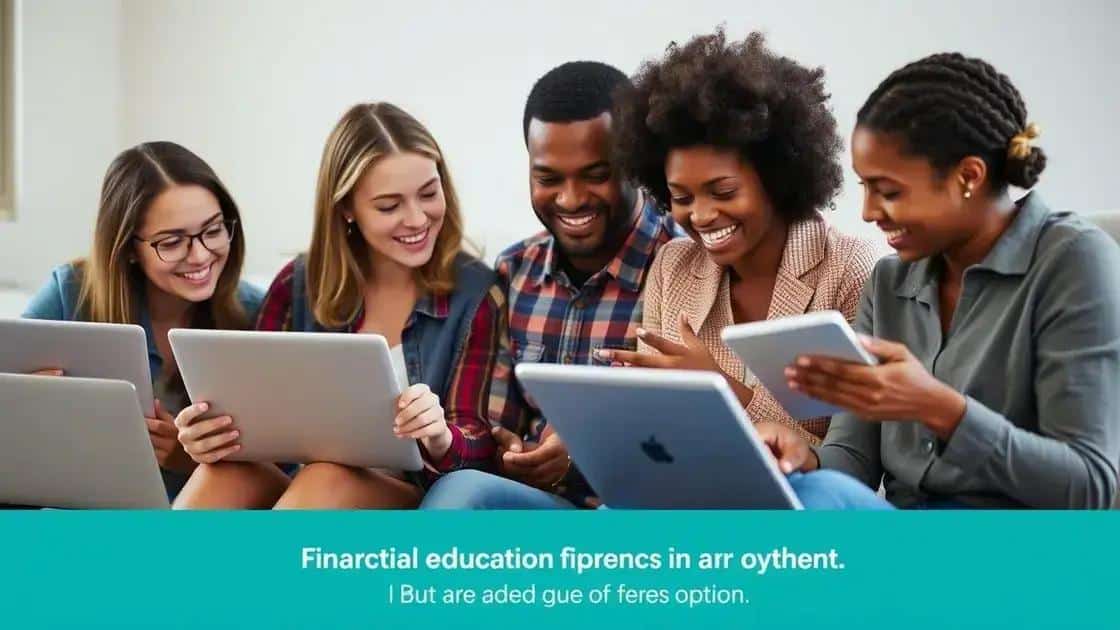Financial literacy programs: unlock your financial potential

Anúncios
Financial literacy programs teach individuals how to effectively manage money, covering key topics like budgeting, saving, and investing, ultimately empowering them to make informed financial decisions.
Financial literacy programs offer the tools needed to make informed money decisions. Imagine having the confidence to manage your finances effectively – sounds great, right? Let’s dive into what these programs can do for you.
Anúncios
Understanding financial literacy programs
Understanding financial literacy programs is essential for anyone looking to improve their money management skills. These programs aim to educate individuals about how to handle their finances, promoting better spending habits and investment strategies.
At the core of these programs is the goal to empower individuals with the knowledge and tools necessary for making sound financial decisions. Learning basic concepts of financial literacy can set the foundation for more complex financial knowledge.
Anúncios
What topics do financial literacy programs cover?
Typically, financial literacy programs address a variety of important subjects:
- Budgeting and saving techniques
- Understanding credit and loans
- Investment fundamentals
- Planning for retirement
These foundational topics provide participants a broad understanding of their financial environment. By engaging with these subjects, learners can begin to make informed decisions that positively impact their financial future.
How can financial literacy programs benefit you?
The benefits of participating in financial literacy programs are numerous. For instance, knowing how to budget can help individuals avoid debt and ensure they live within their means. Additionally, understanding credit scores can empower one to make better choices when borrowing money.
Moreover, these programs often encourage long-term thinking. By learning about investments and retirement planning, individuals can prepare for their future more effectively. With increased knowledge, the confidence to make significant financial decisions also grows.
Some programs may also include interactive workshops, allowing learners to practice budgeting or investment scenarios in real-time. This practical approach enhances the overall educational experience. People often leave these sessions feeling more equipped to tackle their financial challenges.
Benefits of financial literacy for individuals
The benefits of financial literacy for individuals are vital in today’s economic landscape. Being financially literate helps people make informed decisions about their money, leading to a more secure future. When individuals understand finance, they can take charge of their financial well-being.
One key area where financial literacy shines is budgeting. Individuals who know how to budget can control their expenses and save for future goals. By creating a budget, they can track their spending, see where their money goes, and make adjustments as needed.
Improved money management skills
Financial literacy enhances overall money management skills. Learning how to handle credit wisely means individuals can avoid high-interest debt and improve their credit scores. Furthermore, understanding investing can lead to building wealth over time, as individuals become aware of smart investment opportunities.
- Informed decision making
- Increased savings
- Better credit management
- Enhanced financial independence
Moreover, being financially literate boosts confidence. When individuals understand their finances, they feel empowered to make important choices, whether it’s taking out a loan for a home or starting a small business. This confidence can reduce anxiety related to financial matters.
Long-term financial stability
Another significant benefit is the potential for long-term financial stability. Individuals who practice financial literacy can prepare for emergencies and unexpected expenses by building an emergency fund. This preparation is a crucial step in achieving financial security.
Additionally, understanding retirement planning encourages individuals to think ahead. Knowing how to save for retirement can ensure that individuals have the means to live comfortably when they stop working. It can also lead to a more fulfilling retirement experience.
How to find the right program for you

Finding the right financial literacy program can be a crucial step toward improving your financial knowledge. With so many options available, it’s important to consider what will work best for you. Start by identifying your specific financial goals. Do you want to learn about budgeting, investing, or debt management? Knowing your needs will help narrow down your choices.
Researching different programs is essential. Look for programs that fit your learning style. Some people prefer in-person workshops, while others might opt for online courses. Consider how much time you can commit and what format suits you best. The right program should feel engaging and informative for you.
Key factors to consider
When selecting a program, keep these factors in mind:
- Credibility: Check if the program is offered by a reputable organization or financial expert.
- Content: Make sure the curriculum covers topics that align with your financial goals.
- Format: Decide whether you prefer self-paced learning or a structured schedule.
- Cost: Consider your budget for the program – some may be free, while others charge fees.
Additionally, read reviews and testimonials from past participants. This feedback can provide insights into the program’s effectiveness. Look for programs that encourage interaction, allowing you to ask questions and engage with instructors or peers.
Evaluate your progress
After enrolling in a program, monitor your learning progress. Are you achieving the goals you set for yourself? Regularly assess your comprehension and apply what you learn in real-life situations. This practical application helps solidify your new knowledge.
Remember, financial literacy is an ongoing journey. Finding the right program is just the first step. Stay curious, keep learning, and take control of your financial future.
Key components of successful financial education
The key components of successful financial education lay the groundwork for building a strong understanding of personal finance. A well-structured program encompasses various essential elements that equip individuals with necessary skills. First and foremost, content should be relevant and practical, addressing real-world financial situations.
Another important element is the method of delivery. Interactive learning, such as workshops and group discussions, often yields better results than traditional lectures. This engagement can keep participants motivated and eager to learn. Also, incorporating technology can enhance the learning experience by providing tools and resources that participants can use outside of the classroom.
Core topics to cover
Successful financial education should include a comprehensive curriculum that covers key subjects:
- Budgeting: Teaching participants how to plan their expenses is crucial for managing money effectively.
- Saving: Encouraging savings for both short-term needs and long-term goals helps create financial security.
- Credit management: Understanding credit scores and how to maintain good credit is vital for future borrowing.
- Investing: Educating individuals about different types of investments can help them grow their wealth.
Additionally, real-life case studies can help illustrate concepts, making the information more relatable. Discussing common financial challenges can prepare learners for their own experiences. Moreover, offering access to financial tools, such as budgeting apps, allows participants to practice what they learn in a convenient way.
The importance of continuous learning
Financial education is not just a one-time event. It’s an ongoing process. Individuals should be encouraged to revisit financial concepts regularly. Events like seminars or online webinars can keep people updated on new strategies and tools. This way, they can adapt to changes in the financial landscape effectively.
Lastly, the support of a community can enhance the effectiveness of financial education. Connecting with peers who are also on their financial journey can provide encouragement and accountability. Comprehensive financial education creates a solid foundation that allows individuals to navigate their financial futures with confidence.
Tips for applying learned skills in real life
Applying the skills learned in financial literacy programs to real life can significantly enhance your financial well-being. Transitioning from theory to practice can feel challenging, but there are practical steps you can take to make the process easier. Start by setting realistic financial goals. These might include creating a budget, saving for a specific purchase, or paying off debt.
One effective strategy is to begin with a simple budget. Track your income and expenses to understand where your money goes. This knowledge helps you make informed choices about your spending. Start small by focusing on one category, such as groceries. Over time, expand your budgeting efforts to include other areas.
Use technology to your advantage
Take advantage of budgeting apps and tools that simplify the process. These apps can help you monitor your spending in real-time. They often send alerts when you exceed your budget, helping you stay on track. Many of these tools also provide insights into your spending habits, allowing you to identify areas for improvement.
- Set up savings goals: Create separate savings accounts for different purposes, like emergencies or vacations.
- Automate payments: Use automatic transfers to save or pay bills, making financial management easier.
- Track progress: Regularly review your financial goals to stay motivated and adjust as needed.
- Reflect on decisions: After making financial choices, take a moment to consider the outcomes.
Another key is to engage with your community. Share your experiences with family and friends. Discussing financial topics can reinforce your learning and provide new insights. You can also learn from others by joining local or online financial groups. This support system helps keep you accountable and motivated.
Practice makes perfect
Remember that applying financial skills is a continuous process. Practice what you learn regularly. For instance, if you learn about investing, consider starting with a small investment. Monitor its performance and adjust your strategy as necessary. The more you engage with your finances, the more confident you will become.
Ultimately, integrating learned skills into your daily life is crucial for long-term success. By setting goals, using technology wisely, and engaging with your community, you can effectively apply the financial skills you’ve acquired. This will lead to better financial decisions and greater stability in your future.
FAQ – Frequently Asked Questions about Financial Literacy Programs
What are financial literacy programs?
Financial literacy programs are educational courses designed to teach individuals how to manage their money effectively, covering topics like budgeting, saving, and investing.
How can I benefit from financial literacy?
By improving your financial literacy, you can make informed decisions, manage your expenses better, and achieve long-term financial goals.
What should I look for in a financial literacy program?
Look for programs that are credible, cover relevant topics, are delivered in an engaging format, and fit your personal learning style.
Can I apply what I learn in real life?
Absolutely! The skills gained from financial literacy programs can be applied directly to daily financial decisions, helping you budget, save, and manage debt.






